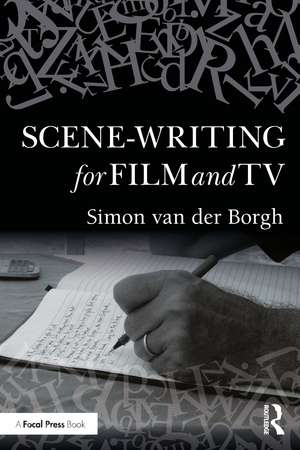Scene-writing for Film and TV
Autor Simon van der Borghen Limba Engleză Paperback – 28 oct 2024
Author Simon van der Borgh familiarises the screenwriter with the fundamental aspects of a scene, looking at what a scene is, the characters involved, the action depicted, dialogue, setting, and style. Featuring original scenes which show the practice of scene-writing and the application of ideas and approaches alongside in-depth analysis and critique, the book explores the process and approach to scene-writing and how to learn and improve methods of telling dynamic, engaging and moving stories of diverse types and formats on screen. With a strong focus on practice-based advice, the book includes exercises at every step to enable writers to build on and extend their knowledge and skills with confidence and clarity chapter by chapter.
Exploring the film and TV scene with its different types, forms, and functions, it is the ideal book for aspiring screenwriters and students of screenwriting and filmmaking at all levels, as well as directors, producers and actors looking to better understand the contextual and sub-textual motivations intended by the writer.
| Toate formatele și edițiile | Preț | Express |
|---|---|---|
| Paperback (1) | 207.88 lei 3-5 săpt. | +16.21 lei 6-12 zile |
| Taylor & Francis – 28 oct 2024 | 207.88 lei 3-5 săpt. | +16.21 lei 6-12 zile |
| Hardback (1) | 1005.17 lei 6-8 săpt. | |
| Taylor & Francis – 28 oct 2024 | 1005.17 lei 6-8 săpt. |
Preț: 207.88 lei
Nou
Puncte Express: 312
Preț estimativ în valută:
39.78€ • 42.54$ • 33.17£
39.78€ • 42.54$ • 33.17£
Carte disponibilă
Livrare economică 27 martie-10 aprilie
Livrare express 12-18 martie pentru 26.20 lei
Preluare comenzi: 021 569.72.76
Specificații
ISBN-13: 9781032277554
ISBN-10: 1032277556
Pagini: 300
Ilustrații: 42
Dimensiuni: 156 x 234 x 22 mm
Greutate: 0.42 kg
Ediția:1
Editura: Taylor & Francis
Colecția Routledge
Locul publicării:Oxford, United Kingdom
ISBN-10: 1032277556
Pagini: 300
Ilustrații: 42
Dimensiuni: 156 x 234 x 22 mm
Greutate: 0.42 kg
Ediția:1
Editura: Taylor & Francis
Colecția Routledge
Locul publicării:Oxford, United Kingdom
Public țintă
Postgraduate, Professional, and Undergraduate AdvancedCuprins
Introduction; 1. Approach: What is a scene?; 2. Character: Whose scene is it? Who is in the scene and why?;
3. Action: What is the scene about? What do we see happening in the scene and why?; 4. Dialogue: What are your characters trying to say?; 5. The Setting: The arena where and when the action is located at a particular point in the story; 6. Formatting & Layout: What should a scene look like on the page?; 7. Style: What does the scene look, feel, sound like?; 8. Theme: What’s your scene really about?; 9. The Sequence: How do we join it all together?; 10. Recap & Conclusion: Why isn’t this scene working? How can I make it work better?; Appendix: Documents A - D; Bibliography
3. Action: What is the scene about? What do we see happening in the scene and why?; 4. Dialogue: What are your characters trying to say?; 5. The Setting: The arena where and when the action is located at a particular point in the story; 6. Formatting & Layout: What should a scene look like on the page?; 7. Style: What does the scene look, feel, sound like?; 8. Theme: What’s your scene really about?; 9. The Sequence: How do we join it all together?; 10. Recap & Conclusion: Why isn’t this scene working? How can I make it work better?; Appendix: Documents A - D; Bibliography
Notă biografică
Simon van der Borgh has worked globally for 40 years, gaining an international reputation as a produced screenwriter, screenwriting teacher, and script consultant. He has delivered his practical scene-writing lectures, masterclasses, and workshops to thousands of students, screenwriters, and filmmakers worldwide. Many of the ideas in this book were developed during his time as Senior Lecturer in Screenwriting at the University of York.
Descriere
Focusing on an integral aspect of screenplays, this book takes students and writers at all levels through the process of understanding and writing better scenes. It interrogates the functions of a scene and how writers can then apply this knowledge to their own film and television scripts.
